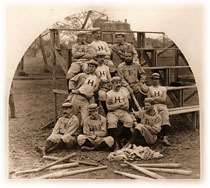The Southeastern Conference is inspecting the fingernails and peering behind the ears of the University of Kentucky's athletics, where, Judge Saul Streit has reported, he detected some traces of grime. It is to be hoped that the investigation is undertaken with the tolerant realization that boys will be boys, now as in all times past.
It has been pointed out that man is an imperfect being and the alert eye will discover flaws in the greatest of our sports heroes. Evidence has been submitted that even the immortal Frank Merriwell of Yale was, for all his matchless physical gifts, a cheat, a braggart, a bully, a sly trickster, a card sharp, a poltroon, and unkind to animals to boot.
 The Harvard stalwarts of 1878
The Harvard stalwarts of 1878 |
Further study now discloses that these facts were known to, or at least suspected by, his schoolmates at the very beginning of his undergraduate career. This is revealed in the definitive work on the subject, Frank Merriwell at Yale, by Burt L. Standish [Gilbert Patten], which reports the following colloquy between "the great and only" Bob Collingwood, of the varsity crew, and Paul Pierson, of the baseball squad, watching Harvard's freshman nine wallop Merriwell's classmates.
"I believe," says Collingwood, "Merriwell has shown up well as a batter in practice."
"He certainly has."
"Well, I should think Old Put would use him for his hitting, if for nothing else....You think Merriwell is held back for reasons not known?"
"I do."
"Say, by jingoes!"
What is the nature of Pierson's suspicions? We shall see. In the seventh inning with the Harvard freshmen leading, 11 to 4, Burnham Putnam, affectionately called Old Put by the Yale freshmen whom he coaches, calls upon Merry as a relief pitcher.
Almost immediately there is a flurry of betting in the stands. Sport Harris, a Yale undergraduate "who was always looking for a chance to risk something," wagers freely against Merriwell. Does he know something?
"Sport Harris coolly puffed away at a black cigar, seemingly perfectly unconcerned, like a born gambler. He had black hair and a faint line of a mustache. He was rather handsome in a way, but he had a pronounced taste for loud neckties."
Now Yale comes to bat, and Old Put, at Merriwell's sly suggestion, orders the lead-off batter to get hit by a pitched ball. The batter is the third baseman, Uncle Blossom, a butcher in the field who, Frank observes, "never got a hit when one was wanted in all his life." One might fairly ask why Old Put keeps him in there.
One might also ask how Old Put would be regarded by Judge Streit, who recently accused Adolph Rupp, Kentucky's basketball coach, of putting victory before the physical well-being of his players. For, instructing Blossom to take a fast ball in the ribs, the Yale coach insists: "Never mind if it does kill you. We are after scores, and a life or two is of small consequence."
Blossom complies, reaches first base, and Merriwell is up. Watch closely now. "Merriwell took his place at bat, having selected a bat that was a trifle over regulation length, if anything." Then as now, the rules limited the bat to a length of 42 inches. But what was that to a congenital cheat? What is to be said of a college that indoctrinates freshmen in sportsmanship by providing illegal equipment?
Merry singles and Yale has runners on first and second with none out. What price Blossom's personal sacrifice now? Merriwell proposes, and the fat-headed Putnam approves, a double steal. A double steal, mind you, with runners on first and second, nobody out, and Yale loading up for what may be a big inning!
Naturally, Merriwell pilfers second, but poor Blossom is retired at third. What does the showboat from Fardale Academy do next? He steals third! He's on second, in position to score on a single, and he deliberately jeopardizes what's left of the Yale rally by an idiotic dash for third.
He makes it, of course, a bootless maneuver as ever was, for now little Danny Griswold hits a double that might have scored both Blossom and Merriwell if it hadn't been for a certain meddling buttinsky.
Naturally, considering the New Haven strategy, Yale is defeated. Not even Merriwell's trickery on the mound can compensate for such doltish behavior on the bases. As to his pitching tactics, "Frank had another trick of holding the ball in his hand and appearing to give his trousers a hitch, upon which he would deliver the ball when neither runner nor batter was expecting him to do so."
Obviously, Old Put is stupid, Merriwell is a sneak, the umpire is either blind or ignorant of the balk rule, or both, and it goes without saying that no Harvard man would so far demean himself as to protest an illegal delivery.
Only Pierson is undeceived. "Merriwell," he concedes, "is a wonderful runner. I found that out last fall when I made up as Professor Grant and attempted to relieve him of a turkey he had captured somewhere out in the country....He slugged me with the turk and then skipped."
One marvels that Pierson does not publicly unmask this thug and poultry thief who goes about the countryside raiding farmers' hencoops. Perhaps he will later, for he says: "I have had my eye on him ever since he entered Yale."
Main Menu ·
Search ·Current Issue ·Contact ·Archives
·Centennial ·Letters
to the Editor ·FAQs



 The Harvard stalwarts of 1878
The Harvard stalwarts of 1878